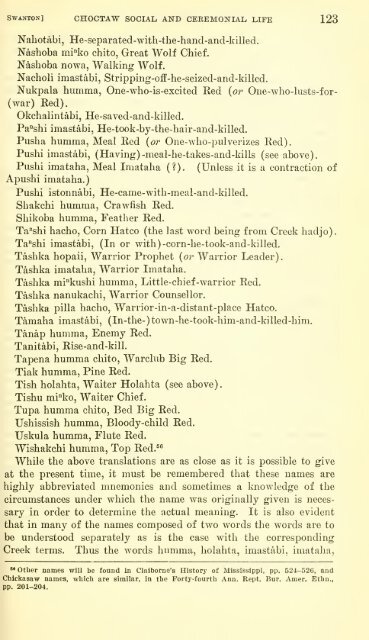siOBX; - Smithsonian Institution
siOBX; - Smithsonian Institution
siOBX; - Smithsonian Institution
You also want an ePaper? Increase the reach of your titles
YUMPU automatically turns print PDFs into web optimized ePapers that Google loves.
S WANTON] CHOCTAW SOCIAL. AND CEREMONIAL LIFE 123<br />
Nahotabi, He-separated-with-the-hand-and-killed.<br />
Nashoba mi°ko chito, Great Wolf Chief.<br />
Nashoba nowa, Walking Wolf.<br />
Nacholi imastabi, Stripping-off-he-seized-and-killed.<br />
Nukpala humma, One-who-is-excited Red {or One-who-lusts-for-<br />
(war) Red).<br />
Okchalintabi, He-saved-and-killed.<br />
Pa°shi imastabi, He-took-by-the-hair-and-killed.<br />
Pusha humma, Meal Red {or One-who-pulverizes Red).<br />
Pushi imastabi, (Having) -meal-he-takes-and-kills (see above).<br />
Pushi imataha. Meal Imataha (?). (Unless it is a contraction of<br />
Apushi imataha.)<br />
Pushi istonnabi, He-came-with-meal-and-killed.<br />
Shakchi humma, Crawfish Red.<br />
Shikoba humma. Feather Red.<br />
Ta°shi hacho, Corn Hatco (the last word being from Creek hadjo).<br />
Ta°shi imastabi, (In or with)-corn-he-took-and-killed.<br />
Tashka hopaii. Warrior Prophet {or Warrior Leader).<br />
Tashka imataha. Warrior Imataha,<br />
Tashka mi°kushi humma. Little-chief-warrior Red.<br />
Tashka nanukachi. Warrior Counsellor.<br />
Tashka pilla hacho, Warrior-in-a-distant-place Hatco.<br />
Tamaha imastabi, (In-the-)town-he-took-him-and-killed-him.<br />
Tanap humma. Enemy Red.<br />
Tanitabi, Rise-and-kill.<br />
Tapena humma chito, Warclub Big Red.<br />
Tiak humma, Pine Red.<br />
Tish holahta, Waiter Holahta (see above).<br />
Tishu mi°ko, Waiter Chief.<br />
Tupa humma chito, Bed Big Red.<br />
Ushissish humma, Bloody-child Red.<br />
Uskula humma. Flute Red.<br />
Wishakchi humma. Top Red.°®<br />
While the above translations are as close as it is possible to give<br />
at the present time, it must be remembered that these names are<br />
highly abbreviated mnemonics and sometimes a knowledge of the<br />
circumstances under which the name was originally given is neces-<br />
sary in order to determine the actual meaning. It is also evident<br />
that in many of the names composed of two words the words are to<br />
be understood separately as is the case with the corresponding<br />
Creek terms. Thus the words humma, holahta, imastabi, imataha,<br />
" other names will be found in Claiborne's History of Mississippi, pp. 524-526, and<br />
Chickasaw names, which are similar, in the Forty-fourth Ann. Rept. Bur. Amer. Ethn.,<br />
pp. 201-204.

















